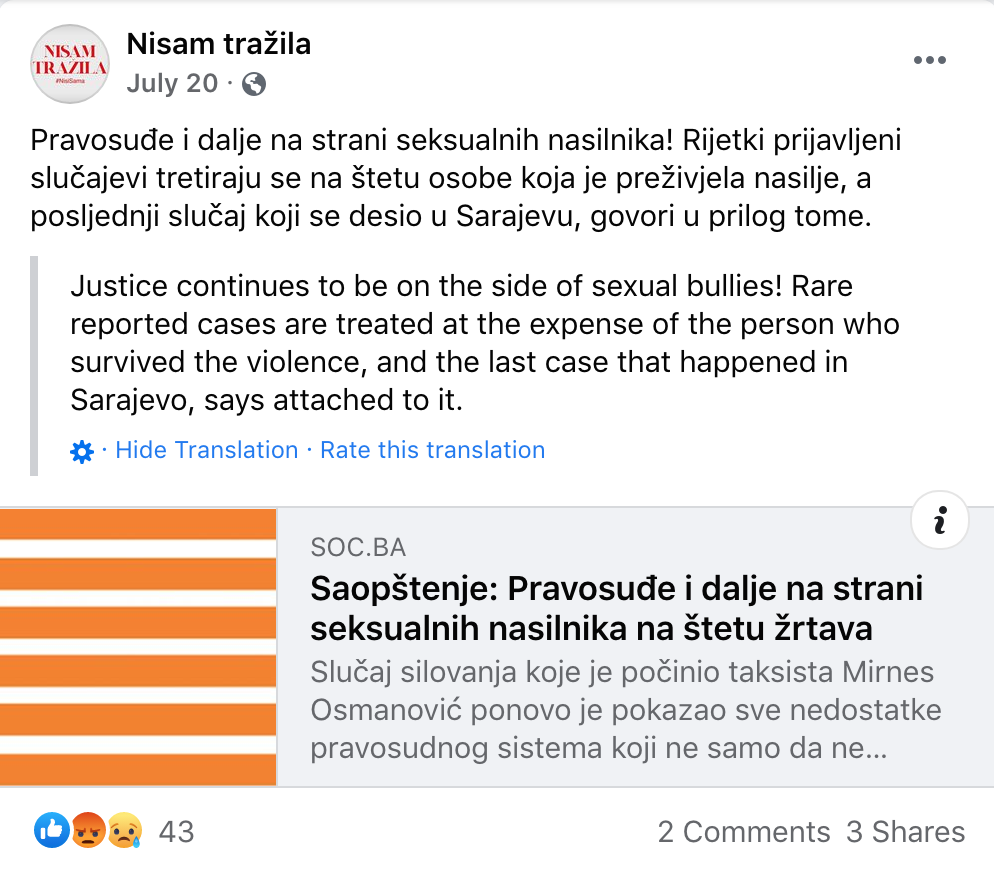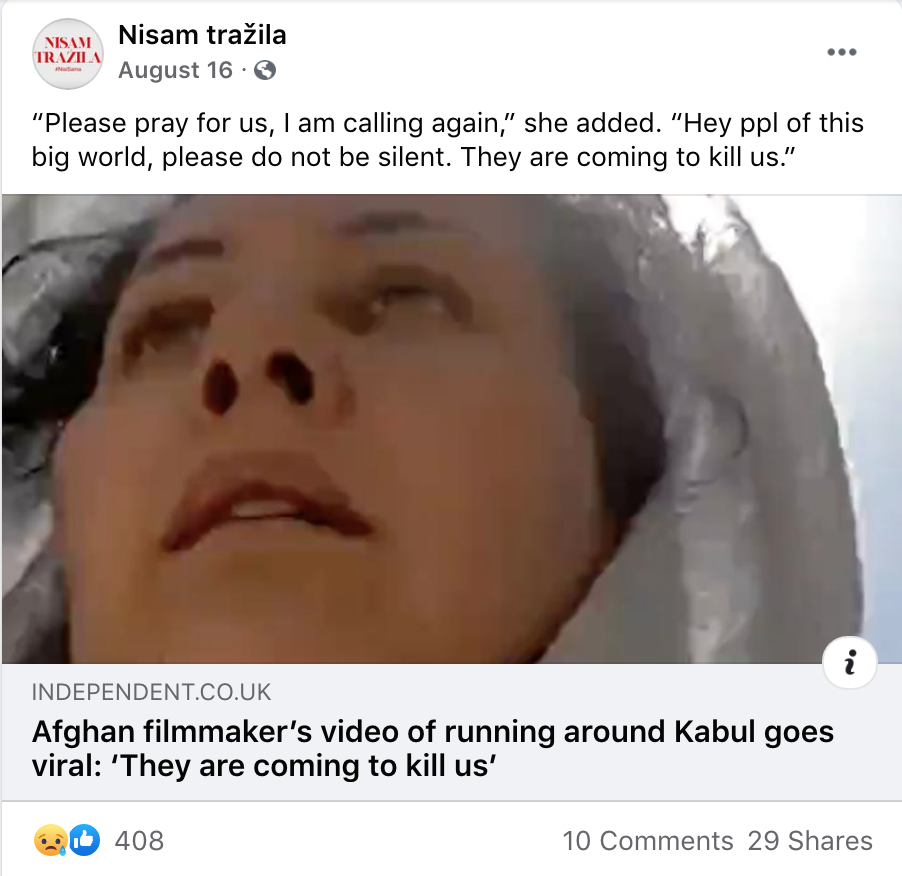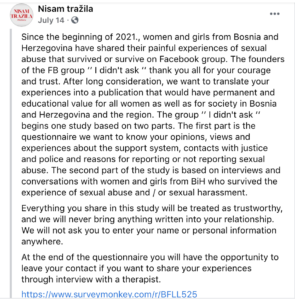Nisam Tražila: How Facebook Affordances reinforce Marginalization

Twitter and Facebook are credited with providing the infrastructure for a new wave of DIY activism. Rosemary Clark-Parson and Jessa Lingel highlight the power dynamics involved in researching these marginalized groups and movements in ‘Margins as Methods, Margins as Ethics: A Feminist Framework for Studying Online Alterity’. Reflecting on the terminology of counterpublics, counterculture and alternative media, Clark-Parson and Lingel argue that misuse of terminology can reinforce power relations which initially marginalized participants. Further, as APIs allow large amounts of tweets to be collected without the user’s agency, the power relations between the researcher and the researched is skewed and must be considered by researchers. By involving members of groups, Lingel and Clark-Parson thus propose an etic/emic approach to analysis and identifying terminology. As feminist movements are emerging on Facebook, there is a relevance for administrators of Facebook groups to also become aware of the margins-as-methods and feminist framework in order to consider their power relations and privacy issues. (Clark-Parsons und Lingel 2020)
Nisam Tražila (I Didn’t Ask For It)
The Nisam Tražila initiative exhibits the complex power structures within digital feminist movements which need to be considered when using the margins-as-methods framework. Founded in January 2021, the Nisam Tražila page exposes the lacking regulations and laws regarding sexual misconduct in the Western Balkans by allowing women to share their personal stories (Mičić 2021). Following accusations against director Misorslav Mika Aleksic, four former students of The Academy of Performing Arts in Sarajevo created the Facebook group (Salihbegovic 2021). The private group has now amassed over 13,000 members, while posts on the public site with over 40,000 followers focus on showcasing the progress made by Institutions and lobbying for change (Salihbegovic 2021).

Figure 1: Sharing of news reports on public Nisam Tražila Facebook Site (Nisam Tražila 2021) 
Figure 2: Sharing of news reports on public Nisam Tražila Facebook Site (Nisam Tražila 2021)
Facebook Affordances and Power Relations
Different Facebook affordances are conducive to creating imbalanced power relations amongst the activists and indicates the advantage of administrators applying feminist reflectivity on their own use of the platform. A study conducted by Josiane Jouët on the development of digital feminist movements in France implies a hierarchy within digital feminist groups influenced by members’ technological knowledge and education (Jouët, 2018). She concludes that activists are young women with an educated middle to upper-class education (Jouët, 2018). Young activists, such as the administrators of Nisam Tražila are aware of the need for digital skills as a way of avoiding and depending on male tech-experts and can recognize the affordances of Facebook in allowing a DIY activist approach (Pierri, 2021). However, by delegating specific digital projects to few members, members with less knowledge of affordances are placed on the margins of the movement. This enables members to engage on an irregular basis, elevating the administrators of Nisam Tražila, to a form of leaders.
Furthermore, Megan Boler, highlights that in the Occupy Wallstreet movement, women were delegated to what she terms “collective labor” and often excluded from more technical requirements (Boler, 2014). Thus, creating three distinct roles: connector, documentarian and admin (Boler, 2014). This structure is also present in Nisam Tražila; however, only the administrators are conducting this “collective labor”. Arguably, the Facebook group is nonhierarchical in low-level affordances as it allows members to comment or like posts (Pruchniewska, 2019). Nevertheless, the administrators have control over what is posted for the digestion of members to like. The victims that are sharing their stories are thus being subjected to documentation and connection efforts of the administrators.
The functional affordance of creating a private group and restricting access leads to a twofold establishment of power relations. The group members are given a sense of protection, implementing a notion of an egalitarian space to share their personal stories (Pruchniewska, 2019). However, the ability of only four administrators to allow or deny access disassembles this egalitarian group structure. Additionally, women sharing their private experiences, provides the administrators of Nisam Tražila a responsibility to maintain privacy and victims’ agency over their own stories. Thus, not only are the administrators a form of leaders, directing the course of discussion, but also gatekeepers to the group and privacy of members. Establishing a power relation that counterbalances the idea of a democratic group. Administrators hence need to actively reflect on the complexity that the functional affordances offer in both protecting identities of victims and granting victims more power.
Duality of Visibility
The Facebook group’s visibility has exposed members of Nisam Tražila to the same misogyny the group is attempting to combat. Sarah Banet-Weiser expresses that the “economy of visibility”, which has made movements focus on strategies to garner more exposure, unwittingly feeds the same algorithms that give visibility to increased online sexist and misogynistic harassment (Banet-Weiser, 2018). Within Nisam Tražila, women’s abusers have recognized themselves in posts and have threatened victims (Mičić 2021). The identity of victims, despite the affordance of a private group and thus imagined “safe space”, is thus violated. This further disempowers those in the margins. Additionally, Nisam Tražila has encountered some significant hacking attempts but were offered assistance from NGOs (Mičić 2021). Again, illustrating that even the administrators have a limit to technological knowledge, as they primarily conduct “collective labor” while a recognized institution assisted them and became involved (Boler, 2014). Highlighting further power relations now present in a group focusing on equaling power relations. To combat future privacy violation incidents, the four admins now delete messages from their inboxes and store their content offsite (Mičić 2021).
From Admins to Researchers

On July 14th, Nisam Tražila announced that they would release a publication based on research conducted in interviews and a questionnaire (Nisam Tražila 2021). The admins will significantly benefit in considering the questions outlined by Clark-Parson and Lingel regarding protection and agency of marginalized group members. By making questionnaire participants ware of the future use of their personal accounts of mistreatment, Nisam Tražila is already making progress in providing participants an agency over the use of their stories that the Facebook group does not necessarily afford. Furthermore, when considering the power dynamics of the Facebook group, Nisam Tražila should consider their own feminist ideologies effect in their research and their power relations to those sharing personal accounts.
As feminist movements have moved into a digital sphere, Clark-Parson and Jessa Lingel framework’s relevance is not limited to scholars but the organizers of digital activism within marginalized groups. Assuming a critical stance on the ethical use of data and power relations, as well as the use of terminology, may allow organizers to come closer to the ideal of an egalitarian community.
Works Cited
Banet-Weiser, Sarah. “THE FUNHOUSE MIRROR.” In Empowered, 41–64. Popular Feminism and Popular Misogyny. Duke University Press, 2018. https://doi.org/10.2307/j.ctv11316rx.6.
Boler, Megan, Averie Macdonald, Christina Nitsou, and Anne Harris. “Connective Labor and Social Media: Women’s Roles in the ‘Leaderless’ Occupy Movement.” Convergence 20, no. 4 (November 1, 2014): 438–60. https://doi.org/10.1177/1354856514541353.
Clark-Parsons, Rosemary, and Jessa Lingel. “Margins as Methods, Margins as Ethics: A Feminist Framework for Studying Online Alterity.” Social Media + Society 6, no. 1 (January 1, 2020): 2056305120913994. https://doi.org/10.1177/2056305120913994.
Jouët, Josiane. “DIGITAL FEMINISM: QUESTIONING THE RENEWAL OF ACTIVISM – Document – Gale Academic OneFile.” Journal of Research in Gender Studies, January 2018. https://go-gale-com.proxy.uba.uva.nl/ps/i.do?p=AONE&u=amst&id=GALE|A550426870&v=2.1&it=r.
Mičić, Đurđa Radulović, The Nisam Trazila Team: Matea Mavrak, Ana Tikvić, Asja Krsmanović, Nadine. “How Facebook Became the New Feminist Battleground for #MeToo in the Western Balkans.” The Calvert Journal. Accessed September 28, 2021. https://www.calvertjournal.com/features/show/12875/feminist-facebook-groups-fighting-change-memes-western-balkans.
“Nisam Tražila | Facebook.” Accessed October 3, 2021. https://www.facebook.com/NisamTrazila/?ref=page_internal.
Pierri, Paola. “Who Can Still Afford to Do Digital Activism? Exploring the Material Conditions of Online Mobilisation.” In Proceedings of the Weizenbaum Conference 2021, 10–13, 2021.
Pruchniewska, Urszula. “‘A Group That’s Just Women for Women’: Feminist Affordances of Private Facebook Groups for Professionals.” New Media & Society 21, no. 6 (June 1, 2019): 1362–79. https://doi.org/10.1177/1461444818822490.
Salihbegovic, Aida Sofic. “The Balkans Face Their #MeToo Moment | DW | 07.02.2021.” DW.COM, February 7, 2021. https://www.dw.com/en/the-balkans-face-their-metoo-moment/a-56469884.
Bibliography
Banet-Weiser, Sarah. “THE FUNHOUSE MIRROR.” In Empowered, 41–64. Popular Feminism and Popular Misogyny. Duke University Press, 2018. https://doi.org/10.2307/j.ctv11316rx.6.
Bhatia, Kiran Vinod. “Full Article: The Revolution Will Wear Burqas: Feminist Body Politics and Online Activism in India,” June 21, 2021. https://www-tandfonline-com.proxy.uba.uva.nl/doi/full/10.1080/14742837.2021.1944850.
Bhattacharjya, Manjima, Jenny Birchall, Pamela Caro, David Kelleher, and Vinita Sahasranaman. “Why Gender Matters in Activism: Feminism and Social Justice Movements.” Gender and Development 21, no. 2 (2013): 277–93.
Boler, Megan, Averie Macdonald, Christina Nitsou, and Anne Harris. “Connective Labor and Social Media: Women’s Roles in the ‘Leaderless’ Occupy Movement.” Convergence 20, no. 4 (November 1, 2014): 438–60. https://doi.org/10.1177/1354856514541353.
Cirucci, Angela M. “Normative Interfaces: Affordances, Gender, and Race in Facebook.” Social Media + Society 3, no. 2 (April 1, 2017): 2056305117717905. https://doi.org/10.1177/2056305117717905.
Clark-Parsons, Rosemary, and Jessa Lingel. “Margins as Methods, Margins as Ethics: A Feminist Framework for Studying Online Alterity.” Social Media + Society 6, no. 1 (January 1, 2020): 2056305120913994. https://doi.org/10.1177/2056305120913994.
Fotopoulou, Aristea. “Digital and Networked by Default? Women’s Organisations and the Social Imaginary of Networked Feminism.” New Media & Society 18, no. 6 (June 1, 2016): 989–1005. https://doi.org/10.1177/1461444814552264.
Harlow, Summer. “Social Media and Social Movements: Facebook and an Online Guatemalan Justice Movement That Moved Offline,” 2012. https://journals-sagepub-com.proxy.uba.uva.nl/doi/full/10.1177/1461444811410408.
Jouët, Josiane. “DIGITAL FEMINISM: QUESTIONING THE RENEWAL OF ACTIVISM – Document – Gale Academic OneFile.” Journal of Research in Gender Studies, January 2018. https://go-gale-com.proxy.uba.uva.nl/ps/i.do?p=AONE&u=amst&id=GALE|A550426870&v=2.1&it=r.
Mičić, Đurđa Radulović, The Nisam Trazila Team: Matea Mavrak, Ana Tikvić, Asja Krsmanović, Nadine. “How Facebook Became the New Feminist Battleground for #MeToo in the Western Balkans.” The Calvert Journal. Accessed October 3, 2021. https://www.calvertjournal.com/features/show/12875/feminist-facebook-groups-fighting-change-memes-western-balkans.
“Nisam Tražila | Facebook.” Accessed October 3, 2021. https://www.facebook.com/NisamTrazila/?ref=page_internal.
Pierri, Paola. “Who Can Still Afford to Do Digital Activism? Exploring the Material Conditions of Online Mobilisation.” In Proceedings of the Weizenbaum Conference 2021, 10–13, 2021.
Pruchniewska, Urszula. “‘A Group That’s Just Women for Women’: Feminist Affordances of Private Facebook Groups for Professionals.” New Media & Society 21, no. 6 (June 1, 2019): 1362–79. https://doi.org/10.1177/1461444818822490.
Pruchniewska, Urszula M. “Branding the Self as an ‘Authentic Feminist’: Negotiating Feminist Values in Post-Feminist Digital Cultural Production.” Feminist Media Studies 18, no. 5 (2018): 810–24. https://doi.org/10.1080/14680777.2017.1355330.
Salihbegovic, Aida Sofic. “The Balkans Face Their #MeToo Moment | DW | 07.02.2021.” DW.COM, February 7, 2021. https://www.dw.com/en/the-balkans-face-their-metoo-moment/a-56469884.
Trott, Verity. “Networked Feminism: Counterpublics and the Intersectional Issues of #MeToo,” n.d.